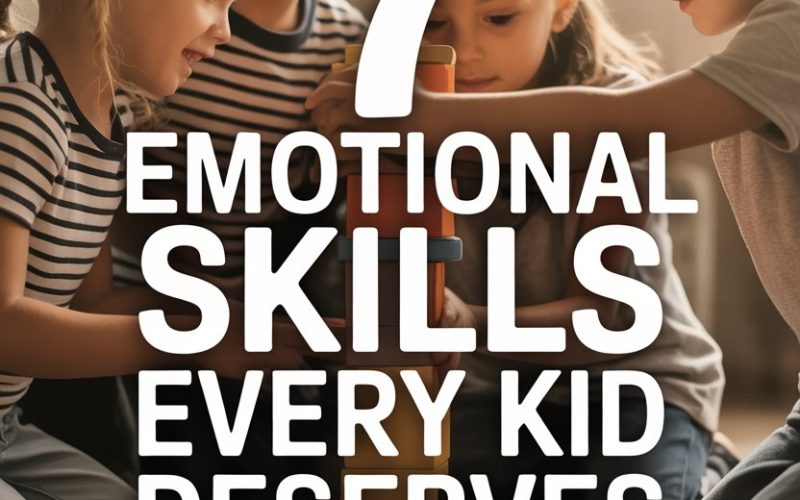Ever wish your child could handle their feelings as easily as they handle a packet of crisps?
Emotional intelligence isn’t something we’re born with—it’s built, one tricky moment (and one dramatic meltdown) at a time.
The good news: kids are natural learners, and we parents are already their favourite teachers—even if the classrooms sometimes smell suspiciously of banana peel.
1. Name the Feeling, Tame the Feeling
Children’s emotions can be a bit like your utility drawer—messy, unexplained, and likely to contain something sticky. The magic starts when you give feelings a name.
This isn’t just parenting folklore; the brain science backs it up. As the International Society for Research on Emotions explains, labelling emotions helps shrink their intensity and boosts self-control.
At home, make emotion-spotting as routine as brushing teeth (ideally with fewer protests).
Feeling charts, silly faces in the mirror, or simply wondering aloud—“You seem frustrated. Is that right?”—all teach that big feelings are normal, not scary.
Ever watched a toddler shout, “I’m FURIOUS!” and then, upon hearing it, dissolve into giggles?
Naming emotions can be surprisingly disarming. Plus, how else do you expect them to master “exasperated” before Year Two?
2. Self-Calm: The Art of Not Losing It
Every family has that tiny human who can go from cheerful cherub to nuclear meltdown before you’ve sipped your tea.
Self-regulation isn’t about suppressing feelings; it’s learning what to do when you’re ready to throw your shoes at someone.
Techniques like deep breathing (smell the flower, blow out the candle), counting to ten, or squeezing a pillow can work wonders. Sometimes, you’ll feel like you’re teaching a goldfish to knit—repetition, repetition, repetition.
Don’t expect overnight miracles. According to Harvard’s Center on the Developing Child, self-regulation builds slowly, brick by brick, with practice and patience.
Yes, you’ll probably need to model it yourself—no slamming the fridge door when someone’s put the cheese back upside down.
3. Empathy: Seeing the World Through Someone Else’s Muddy Wellies
Empathy often gets mistaken for just saying “sorry” a lot. It’s so much richer than that.
Children who learn to tune in to other people’s feelings tend to make stronger friendships and are less likely to star in a playground drama.
Start with stories—books are empathy’s secret weapon.
Pause and ask, “How do you think she felt when her friend left her out?” Or, after watching a sibling squabble, wonder aloud, “If you were him, would you feel a bit sad right now?”
You can’t force empathy, but you can plant seeds.
Child psychologist Dr. Michele Borba suggests sharing your own feelings and showing compassion in everyday life, from apologizing when you snap (parents, we’ve all been there) to helping a neighbour carry the bins.
One day, you’ll catch your child comforting a mate who’s had a rough day. Try not to burst with pride.
4. Boundaries: Saying No Without Guilt (or Shouting)
Many adults struggle with boundaries—just ask anyone who’s ever agreed to bake 48 cupcakes for the class. Teaching kids to voice their limits early is a lifelong gift.
Practice scripts at home: “No, I don’t want to play that game,” or “Please don’t grab my pencil.”
Role-play helps kids find their voice before the peer pressure kicks in. Remind them: it’s okay to say no, and it’s okay if someone else feels disappointed.
Experts from Child Mind Institute argues that boundaries aren’t about being rigid—they’re about respect for yourself and others.
Even the smallest child can learn: “My body, my rules,” and “If I’m upset, I can ask for space.”
You’ll be grateful you started this early, especially the first time your teen says no to something risky—not just another round of Monopoly.
5. Problem-Solving: The “What Now?” Superpower
Life doesn’t come with an instruction manual. (Unless you count the IKEA flat-pack, which—let’s face it—is only good for a laugh.) Resilient children know how to solve problems rather than panic or give up.
Encourage your child to think of solutions, even small ones. Spilt milk? What could clean it up fastest—sponge or towel? Forgotten lunchbox? Brainstorm together: borrow, share, or ask the teacher.
The Child Mind Institute recommends a problem-solving “script”: What happened? What are some ways to fix it? What might happen if we try each? Pick one and give it a go.
You’re not raising a robot with the right answer every time, just a human who can face the unexpected without turning into a puddle. And sometimes, the solution is just a cuddle and a fresh start.
6. Asking for Help Without Shame
Somewhere between toddlerhood and Year Five, many kids decide that asking for help is “babyish.” Time to smash that myth.
Kids need to know that seeking support is a strength, not a weakness, whether it’s for a maths problem or a tough day at school.
Share your own moments of struggle: “I was stuck at work, so I asked my mate for advice.” Praise your child when they ask for help, even if it’s just opening a jam jar.
Research from the Australian Parenting Website shows that kids who feel safe reaching out are less likely to struggle alone as teens.
Bonus: The more they ask, the more you’ll hear those sweet little “Can you help me?” requests—sometimes for reasons as mysterious as “my sock feels weird.”
7. Self-Compassion: The Voice Inside Their Head Matters Most
Ever hear your child mutter “I’m so stupid” after a mistake? Cue the parent heartbreak. Self-compassion is about treating yourself kindly, even when you’ve mucked up.
Model your own self-talk: “Oops, I burnt the toast. Good thing I know how to make more!” Replace harsh words with a gentle nudge: “You tried your best. Everyone gets things wrong.”
Reaserchers suggest children who practice self-compassion recover faster from setbacks and have better mental health.
Try bedtime affirmations, or leave little notes—“You are brave,” “You are clever,” or, on truly trying days, “You are not the only person who can’t remember where they put their shoes.”
Raising Emotionally Strong Kids: One Messy Day at a Time
None of us get it right every time. (If you do, please write in. We need to know your secrets.)
Emotional skills are built in the thick of things: when tempers are frayed, knees are grazed, and patience is in short supply.
Cheer yourself on when you catch your child naming a feeling, setting a boundary, or bouncing back from a tough day. Small wins count.
And if nothing else—you’re teaching them the most important lesson of all: that love and belonging aren’t reserved for perfect kids (or perfect parents).
They’re for all of us, on our messiest, most magnificent days.




